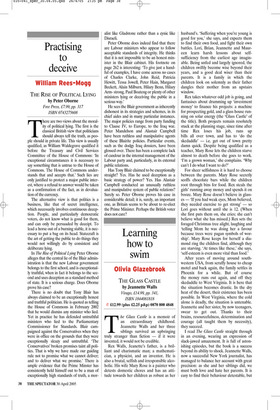Practising to deceive
William Rees-Mogg
THE RISE OF POLITICAL LYING by Peter Oborne Free Press, £7.99, pp. 317 ISBN 0743275608 There are two views about the morality of political lying. The first is the classical British view that politicians should always tell the truth, as people should in private life. This view is usually qualified, as William Waldegrave qualified it before the Treasury and Civil Services Committee of the House of Commons: ‘In exceptional circumstances it is necessary to say something that is untrue to the House of Commons. The House of Commons understands that and accepts that.’ Such lies are only justified to protect a major public interest, where a refusal to answer would be taken as a confirmation of the fact, as in devaluation of the currency.
The alternative view is that politics is a business, like that of secret intelligence, which necessarily involves continuous deception. People, and particularly democratic voters, do not know what is good for them, and can only be persuaded by deceipt. To lead a horse out of a burning stable, it is necessary to put a bag on its head. Statecraft is the art of getting the public to do things they would not willingly do by consistent and deliberate lying.
In The Rise of Political Lying Peter Oborne alleges that the central lie of the Blair administration is that the new Labour government belongs to the first school, and is exceptionally truthful, when in fact it belongs to the second and uses deception as a standard method of state. It is a serious charge. Does Oborne prove his case?
There is no doubt that Tony Blair has always claimed to be an exceptionally honest and truthful politician. He is quoted as telling the House of Commons in February 2002 that he would dismiss any minister who lied. Yet in practice he has defended untruthful ministers who lied to the Parliamentary Commissioner for Standards. Blair campaigned against the Conservatives when they were in office on the grounds that they were exceptionally sleazy and untruthful. ‘The Conservatives’ broken promises taint all politics. That is why we have made our guiding rule not to promise what we cannot deliver; and to deliver what we promise.’ There is ample evidence that the Prime Minster has consistently held himself out to be a man of exceptionally high standards of truth, a mor alist like Gladstone rather than a cynic like Disraeli.
Peter Oborne does indeed find that there are Labour ministers who appear to follow acceptable standards of integrity. He thinks that it is not impossible to be an honest minister in the Blair cabinet. His footnote on page 262 is interesting: ‘To give just a handful of examples, I have come across no cases of Charles Clarke, John Reid, Patricia Hewitt, Tessa Jowell, Peter Hain, Margaret Beckett, Alain Milburn, Hilary Benn, Hilary Armstrong, Paul Boateng or plenty of other ministers lying or deceiving the public in a serious way.’ He sees the Blair government as inherently dishonest in its strategies and schemes, in its chief aides and in many particular instances. The major policies range from party funding to Clause IV, to Europe, to the Iraq war. Peter Mandelson and Alastair Campbell have been ruthless and manipulative agents of these Blairite policies. Particular events, such as the dodgy Iraq dossiers, have been glossed over. There has been a complete lack of candour in the internal management of the Labour party and, particularly, in its external public relations.
Has Tony Blair claimed to be exceptionally straight? Yes. Has he used deception as a basic strategy of power? Yes. Has Alastair Campbell conducted an unusually ruthless and manipulative system of public relations? Surely so. Peter Oborne proves his case in considerable detail; it is, surely, an important one, as Britain seems to be about to re-elect the Prime Minister. Perhaps the British voter does not care?




















































 Previous page
Previous page